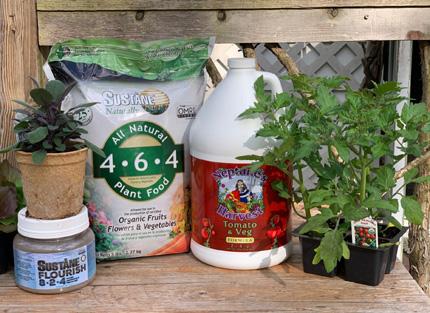
Feeding in Late June
Nancy DuBruleShare
It is late June in CT. What a spring we have just had! Summer has arrived, starting with a hot and humid spell, followed by a deep, soaking rain. That pattern has been happening for a while now. What that means to me is its time to pay attention to ORGANICALLY FEEDING your plants. Not ALL of your plants, but certainly some of them. Let me explain...
First up are your container gardens. We are talking pots on the porch or deck as well as anything growing in Smart Pots or Big Bag Beds. These are watered often, especially when it is very hot. Regular watering leaches out nutrients. I feed anything in containers every other week. I alternate between using Neptune's Harvest Fish Emulsion/Liquid Seaweed and a granular organic fertilizer such as Sustane or fish based Coast of Maine.

Look at the different types of organic fertilizers in this picture. I know it can be confusing to understand which ones to choose. Start with the number formulation. The first number stands for NITROGEN. This makes leaves grow lush and healthy. If you are growing leafy plants (lettuce, cabbage, Swiss chard, Coleus, ferns) then use a fertilizer like Sustane Flourish which has a formulation of 8-2-4. The first number is much higher than the second number and encourages leaves.
If you are growing plants for flowers and fruit or vegetables, you will want to feed with a formulation that has a higher second number which represents phosphorus. This increases flowering which then increases fruits and vegetables. The granular Sustane 4-6-4 in the picture above is ideal for this.
Granular fertilizers are simply sprinkled on the surface of your pots and scratched in. Sustane Flourish is a powder that is mixed with water. Simply read the directions for each individual type of fertilizer.

Neptune's Harvest brand of liquid fertilizer have been used by organic gardeners for years. It is a trusted brand that really works. It does have a fishy smell but plants love it. I water my containers with Neptune's Harvest every other time I fertilize. You will notice a few different types on our shelves. The formulations are tweaked for specific types of plants- roses and flowers, tomatoes and vegetables, and all-purpose. Don't discount the power of the seaweed in these fertilizers! It encourages the all-important feeder roots to grow which makes plants much more efficient at taking up water and nutrients.

The result of feeding your containers is that they will continue to flower and thrive all summer long as you can see by some of the pots on the steps of my deck late last summer. It is SO important.

Smart Pots are an amazing way to grow plants because air goes through the fabric and causes quick, healthy root growth. But, as the weather heats up and the roots begin to fill the Smart Pots, you will find yourself watering every other day. Be sure to keep to your feeding schedule. You can mix some Coast of Maine Quoddy lobster compost in with the Sustane granular organic fertilizer when you scratch it into the surface of the soil to add extra organic matter. You can also mulch the top our your Smart Pots with Mainly Mulch shredded straw to help keep the moisture in.
In the ground, not everything you are growing needs to be fed at this time of year by any means! I pay attention to my vegetables in late June, especially after lots of heat and rain. I sidedress my plants with the same granular organic fertilizer/compost mixture at least once a month. I also liquid feed my vegetables with Neptune's Harvest Tomato and Vegetable liquid fertilizer. I pay particular attention to cucumbers (they love to be fed!) and corn.

I do not feed my perennials and shrubs after the initial spring feeding unless they are repeat bloomers (such as many daylilies). The early spring feeding of compost and organic granular fertilizer is enough for the season. But roses are a different story! After your roses have bloomed, you should cut off the dead flowers and open prune them for a second time. Usually this happens in mid-July, but some of my roses have finished already in this crazy year. I always feed them after this pruning, using compost and granular organic fertilizer. This helps them grow fresh, healthy, new leaves and set up their next round of buds.

I also feed any annual flowers I have growing in the ground, especially my beloved zinnias, cosmos, and dahlias. I follow the same alternating schedule in June and July and then back down in late summer. Annuals complete their life cycle in one growing season. Give them the care and feeding that they love and they will reward you with many flowers and a long bloom time.
If you ever have any questions about what to feed and which organic fertilizers to choose, ask a Natureworker! We LOVE to talk about how you can grow a healthy, happy organic garden and we can match you with the organic fertilizers that will work the best for you.
